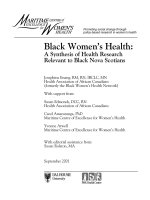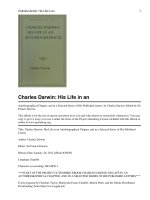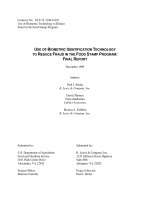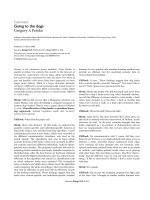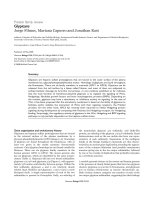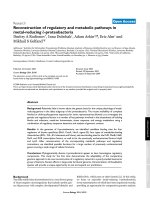The reflection of masculinity in Dheva novel of S. Plai Noi
Bạn đang xem bản rút gọn của tài liệu. Xem và tải ngay bản đầy đủ của tài liệu tại đây (363.91 KB, 4 trang )
THE REFLECTION OF MASCULINITY IN DHEVA
NOVEL OF S. PLAI NOI
Ditsayatas Sriboonrueng
Graduate Student of Thai Language, Faculty of Humanities and Social Sciences,
Khon Kaen University, Thailand
Rattana Chantao
Thai department, Faculty of Humanities and Social Sciences,
Khon Kaen University, Thailand
Abstract
The objective of this research is to study the masculinity’s reflection that appears in
Dheva Novel of S. Plai Noi. This study was a documentary research from Dheva Novel
Book of S. Plai Noi, and presented the data in descriptive analysis. The researcher used
J.A.Doyle’s Framework as an analyzed framework.
The study indicates that masculinity which is appeared in Dheva Novel of S. Plai
Noi is mostly reflected in the success of masculinity; especially the male god that is
presented to succeed, the highest success is god blessing. The success was mentioned often.
It is consist of self-confidence, and aggressiveness which are all three masculinity’s
qualifications in one person. Moreover, another that mostly appeared in this Dheva Novel
of S. Plainoi is sexual attraction which is in sight through a variety of characters.
Keywords: Literature, Dheva Novel, S. Plainoi, Masculinity
1. Introduction
Literature is accepted in the academic society. It is a source that reflects the social,
cultural, political, historical aspects, and faith, nevertheless, literature form is fiction
writing. Literature is able to reflect some social aspects. The writer's reflection is the
sentiment and value of the author's novels.
S. Plai Noi is a well-known and widely used pseudonym of Sombat Plainoi. He is
the documentary writer about Thai history, culture, geography, tradition, and Thai society
in various aspects. He was honored as a national literary artist, art created language in
2010. S. Plai Noi reflected the sentiment and value through his writing, for example,
Animal, Plant, Dheva, Non-human, Lunar, Jewelry, Himmapan creatures, Dragon, The 12
zodiacs, and Garuda. These writings are one kind of literature which mirror social,
historical, literary, traditional aspects, faith, and legend. Moreover, S. Plai Noi showed the
gender that is masculinity’s appearance through character in his writing.
In term of “gender” in Thai academic circle, there are many words of “Gender” to
use in Thai language such as sex status, gender, role of male and female, the relationship
between male and female, the powerful relation between male and female, and female and
male. The term "gender" in the definition of American-British feminist is used to indicate
the difference between sex and gender that implying sex is a biological classification,
while gender is socially constructed. Feminist scholars, is influenced by psychoanalysis,
argue that sexual and gender identity are closely related and cannot be separated yet.
495
However, there are many different meanings of gender, it is stated that gender is not only
role of male and female, but also sexual status with power, social class, ethnicity. The
other significant differences are under political, economic, social, cultural, or historical
conditions in a short period that can affect the allocation and accession to the power and
social resources in each period of time. Furthermore, gender also manifests the fluent of
sexuality that consisted from complex factors (Kritaya Archavanitkul et.al, 2004) and
covers the expectations of femininity and masculinity in terms of belief, attitude, and myth.
Including the tradition has become social norms in the femininity and masculinity. Gender
issue is a study of basic biological aspect in human behavior. In the biology is required in a sexual
but not the sexual behavior. The difference between women and men humans also reflects the
interaction between the physical requirements, plan of social life (Kanjana Kaewtep, 2001).
Meaning of gender will be thoroughly explained and classified by nature of each
gender which are displayed in sexuality, for example, the males has to have masculinity:
steadiness, aggressiveness, stubbornness, and reasonableness. They also have the ability to
think systematically, having psychoanalysis and access fairness, and control emotions.
According to the females or the femininity, they are feeble, modest, helpful, mindful,
polite, sensible, caring others, and unselfish. Society has to do everything in its power to
keep males in a nature of masculinity and keep females in a nature of the femininity in
order to preserve the order of culture and the peace of society. Sexuality is the property of
individuals who are above social change.
Therefore, he writing of S. Plai Noi is a work reflecting the aspects of faith, and
myths, but the content also discussed geography, history, politics, governance, notion,
bourgeois lifestyle, social class, family status, and sexual status or gender, especially gender
issue “masculinity. Another interesting issue is S. Plai Noi how to show the reflection of
masculinity appearance. Thus, the researcher implemented Doyle's (1991) concept of
masculinity as a framework for this study. Because of the strategy of character creation of S.
Plai Noi, it is a set of ideas in many ways, or it may be a social building in his ideal that is
aware of the paradigm and experience. The concept of masculinity is a key concept in this
research as a tool to examine the writer's concept of masculine patterns and processes.
2. The research result
The results of this study reflect masculinity in Dheva Novel of S. Plai Noi that
presented in various and different aspects. It can be concluded as follows:
1. Don’t be female is expression character with strength, high confidence,
decisiveness, and venturousness of doing business or lifestyle in Dheva Novel. There is
also masculinity expression that is not the femininity. Generally, the myth of Dheva Novel
of S. Plai Noi often reflected through social context in that period totally adhere with faith
and society that respect to gods. All gods must to be the male. They are believable and
admirable in accordance with the tradition at that time. Hence, the myth of Dheva Novels
presented that are masculinity image.
2. Be successful is one of masculinity appearance that must succeed in his life and
is expected to success. Masculinity has to be success in the myth of Dheva Novels, mirrors
in the story of Shiva, a major god. Both in the story of Narayana and Brahma are a success
496
that put on an act as a god to all three divinities. Masculinity reflection that succeeds in his
life as King Devanagari and King Dhossarot are defined the perfect king. The successful
masculinity in the myth of giants is to be a rival of the gods in a region. These cause the
faith and respecting the gods in the region.
3. Be aggressive that happens through castes in Dheva Novel is showed that
masculinity with the aggressiveness’s framework express through the gods’ myth. Indra is
the king of angry god when he was annoyed by others, and he was senseless when he
drunk. Then, King Devanagari is aggressive and impolite for being the king. Hermit
Viswamitra is a powerful person that can use the power of the punishment of others,
showing the character of the cruel. The giants are presented as villains, allowing the image
of the gods to be sacred, and fearless. These expressions also are aggressive. Gods, giants,
and kings are made known as an aggressive image under the power of anger forever
following to the faith and culture of the admiration which are not able to separate.
4. Be sexual that appears in Dheva Novel is masculinity reflection with sex
attraction which displayed through the myth of good gods: Shiva, Narayana, Devanagari,
Brahma, Indra, God of Death, and God of Sun. The above is showed masculinity image
clearly in lots of sexual partners. These identify gods’ power of merits of whole people.
Moreover, sexual attraction reflects their images through the myth of demons. Thossakan,
and Norrakarsoon are the villain that reflect to take advantage of other people's lovers to
show the degradation of their gods opponents.
5. Be confident that appears in Dheva Novel of S. Plai Noi is masculinity reflection
with self confidence in the myth of Dheva Novel through the legend of Ramayana and
Giant Hirantra. The expression demonstrates the capacity of them. If they are protagonist,
the characteristic will be believable. On the other hand, if they are villains, the
characteristic will be aggressive. Both characteristics reflect the cultural expression of
masculinity following to the social context.
The conclusion about masculinity in Dheva Novel of S. Plai Noi revealed that the
characteristics of male with bravery, confidence, decisiveness, especially aggressiveness.
These are considered that the morality in the past society was humble, specifically a
doctrine or a moral system. Religious in Brahmanism opinion in human equality was not
widespread. The lifestyle of the people in society is based on ancient ethics that focused on
strength, and the physical strength was the principal. Therefore, masculinity reflected in
the above appearances the researcher mentioned.
References
1. Kritaya Archavanitkul, Chuenruthai Kanjanajitra, Vassana Im-em, & U-sa
Lertsrisantat. (2004). The Violence in the Matrimony with Women’s Health. Nakorn
Pathom: Institure for Population and Social Research, Mahidol University.
2. Kanjana Kaewtep. (2002). The Article: Women and Cultural Study. Bangkok:
Chulalongkorn University. Phongpak Juengvimutipan. Some Factors Relating to
Masculinity and Femininity of Female Adolescents. Master’s Thesis, Master of Education
Program in Developmental Psychology, Graduate School, Srinakharinwirot University.
497
3. Prisara Saekuay. (2001). Femininity Study: Nationalist in Thai Femininity
Study Report the Failure in Literature Reviews. Chiang Mai: Thanabannakan Printing.
4. Passorn Limanont. (2011). Gender’s Role, Woman Status with the
development. Bangkok: College of Population Studies, Chulalongkorn University.
5. Phumwilai Siripoldej. (2007). Gender and development in Lao rural society:
a case study of the Nam Tan Development Project. Master’s Thesis, Master of Art in
Femininity Studies, Graduate School, Chiang Mai University.
6. Meechoke Rastranuwat. (2001). The Negotiation of gender in women and
men magazines. Master’s Thesis, Master of Communication Arts in Communication Arts,
Graduate School, Chulalongkorn University.
7. Rattana Arunsri. (2004). A brief social history of tattooing in gender
interrelation perspective. Master’s Thesis, Master of Arts in Feminminity Studies,
Graduate school, Thammasat University.
8. Royal Institute. (1982). Royal Institute Dictionary. Bangkok: Aksorn Charoentas.
9. Warinthorn Benjasri. (2006). Gender analysis in advertising langauge in Thai
magazines. aster’s Thesis, Master of Education in Thai Teaching Program, Graduate
school, Chiang Mai University.
10. Witcha Santanaprasit. (2000). Presentation of Masculinity in Thai movie
during year B.E.2541-2542. Master’s Thesis, Master of Communication Arts in Mass
Communication Program, Graduate school, Chulalongkorn University.
11. Wilasinee Pipitkul. (2002). Gender Discourse in Newspapers. Bangkok: The
Thailand Research Fund.
12.Wisut Leksomboon. (2002). Dynamic of Power relationship in family life and
gender status of Mien Women (Yao) under the effects of the development. Master’s Thesis,
Master of Arts in Community Development Program, Graduate school, Chiang Mai University.
13. Siranat Kha-nhom. (2004). Perception of gender’s role and health behavior in
Thai society. Case Study: Woman with sexually transmitted disease. Master’s Thesis,
Master of Sociology in Sociology Program, Graduate school, Chulalongkorn University.
14. S. Plai Noi (Pseudonym). (2012). Dheva Novel. 4th Edition. Bangkok: Gypsee Printing.
15. Amornrat Rattanapasul. (1991). Presentation of Masculinity in Thai Popular
songs: Analysis of popular male singers during year B.E.2531-2533. Master’s Thesis,
Master of Arts in Mass Communication Program, Graduate school, Chulalongkorn University.
16. Arussaya Phoopat. (2004). Food: Understanding of gender, social class, and
power. Master’s Thesis, Master of Arts in Femininity Studies Program, Graduate
school,Thammasat University.
498

